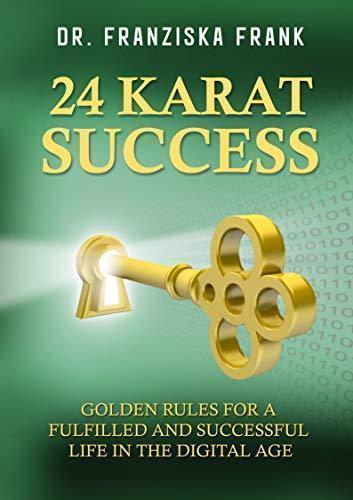This book is a clever, lively and practical toolkit for those who are worried about getting lost in the digital age and want to build on their strengths as humans. All too often we do not know exactly what is inside us, where our limits are and how we can effortlessly increase our influence on ourselves and others. 24 golden rules help us to understand and optimize our hardware, to compensate for our programming errors and to apply our software wisely to influence ourselves and others positively.
"What a profound and spirited way to empower people for the digital age. Every day is about the right choice of behavioral patterns in work and private life. This book has not only expanded my knowledge, but also my options in terms of behavior toward customers, employees, family and myself."
Frank Harting, Member of the Board of Management of HDI Global SE
'Franziska Frank has written an original book on the human condition, on our propensity to avoid taking responsibility for our own situations, preferring to point the finger of blame at others.
The rules identified in 24 Karat Success – on how to change our lives - are based on her own unique experiences and the insights of others: how we function as humans, the choices available to us, and how we find and defend our values. This is a lively and vital work, one borne of courage and experience, one that provokes and causes us to reflect about who we are and how we might improve ourselves.'
Philippe Sands, barrister and writer
There was a time when people wanting to know how to improve their lives would read books of maxims or essays, usually written by aristocrats who were a bit more observant and reflective than most of their class and had a bit of time on their hands. France had Rochefoucault and Montaigne. Britain had Lord Chesterfield, whose Letters to His Son on the Art of Becoming a Man of the World and a Gentleman clearly defines his limited audience. The genre might be traced back to Aesop’s fables and the meditations of Emperor Marcus Aurelius.
These days we have self-help books written by psychologists, pundits, gurus and life-coaches of every description. None of them is an Emperor and not many are aristocrats. Their qualifications vary, but the format is usually a few stories, a bit of pop psychology and some exercises to try out. Stylistic elegance is not a requirement.
Enter Franziska Frank, who has written a delightful synthesis of the old and the new, avoiding the vices and combining the virtues of both.
She combines the powers of observation and reflection of the likes of Rochefoucauld and the practical orientation of modern authors. In doing so she draws on an eclectic international background. A German educated in England, she is a Russian scholar, a lawyer, a management consultant, business school executive and, not least, a wife and mother. She draws on a vast range of sources and personal experiences but ties them all together with the lightest of touches, a good sprinkle of wit, and even some delightful little cartoons of her own.
Her 24 carats – little nuggets of gold – are arranged in three parts: hardware, which covers the instincts we have inherited from our evolutionary past; programming, which covers psychological biases affecting decision-making which many readers will be familiar with from the work of Daniel Kahneman; and software, which is about how to change.
Each carat has a chapter of its own with the same structure: stories from a range of different fields to illustrate the point; some scientific grounding of the phenomenon; a statement of the ‘golden rule’; some lessons for work, for home and for yourself; and finally some things for you to think about.
Thankfully the tone is not didactic enough to list a set of exercises you know you will never carry out, but there are some bits of practical advice that could be useful. For example, Karat 9 recommends countering our well-documented bias towards over-confidence by getting rapid feedback. This chapter also shows a pleasing feature of the book, which is to see things from all sides. Self-confidence can lead to over-confidence and hence delusion, but it can also be good. Problems only occur at the extremes – shades of Aristotle here.
You may not be inclined to read Aristotle, but instead you might be pleasantly entertained and instructed by reading a Karat or two from Franziska Frank before going to sleep at night. It certainly beats checking your Facebook account.
Stephen Bungay, Author and lecturer
The book for the digital age to empower people
If you are worried about getting lost in the digital age, this book provides you with a smart, lively, practical toolbox to build on your strengths as a human being. For all too often we do not fully understand what precisely is invested in us, where our limits are and how we can easily increase our influence on ourselves and others. 24 golden rules help to understand and optimize our hardware, to compensate for our programming errors and to use our software wisely in order to positively influence ourselves and others.

